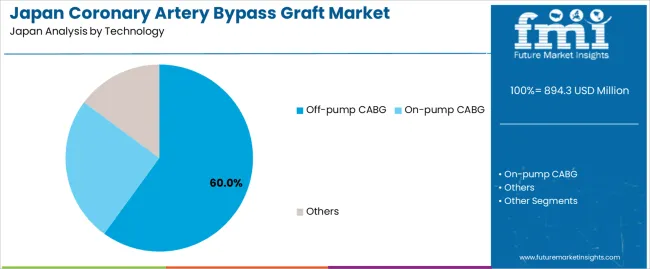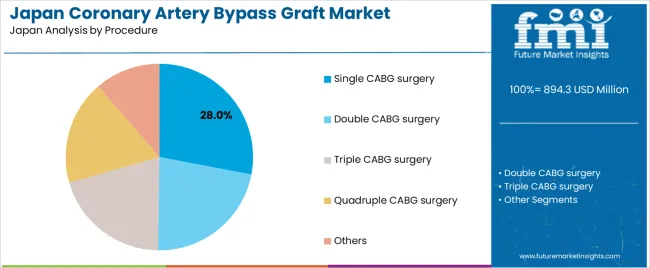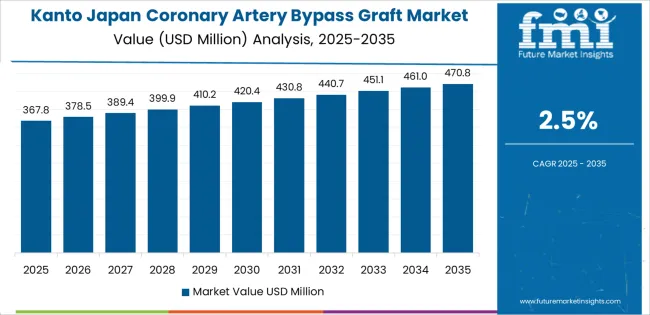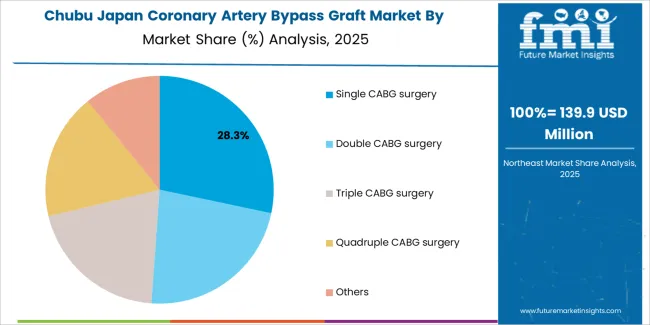The demand for coronary artery bypass graft (CABG) procedures in Japan is projected to grow from USD 894.3 million in 2025 to USD 1,108.9 million by 2035, reflecting a CAGR of 2.2%. CABG remains a crucial treatment for patients with severe coronary artery disease, where other methods such as angioplasty are less effective. The market growth is driven by the aging population, increasing rates of cardiovascular diseases, and advancements in surgical techniques. Despite the increasing availability of minimally invasive options and non-surgical treatments, CABG continues to be the treatment of choice for high-risk patients and those with complex coronary conditions.
The demand for CABG procedures will be supported by improvements in post-surgical recovery, the growing focus on preventive care, and the development of more advanced heart surgery techniques. However, the rising adoption of less invasive procedures and medical technologies might affect the pace of CABG growth in the latter part of the forecast period. Still, the market will maintain steady demand, especially among patients with advanced cardiovascular conditions.

The early vs late growth curve comparison for CABG procedures in Japan reveals distinct patterns in the demand dynamics over the forecast period.
In the early phase (2025-2030), the market will grow from USD 894.3 million to USD 995.8 million, contributing USD 101.5 million in value. This period will see moderate acceleration as the demand for CABG procedures rises with increasing cases of coronary artery disease, aging patients, and advances in surgical techniques. The growth in the early years will be driven by a higher rate of traditional CABG surgeries due to the increasing complexity of coronary conditions that require open-heart surgery. This phase is expected to have relatively strong growth, as patients continue to seek traditional surgical solutions for severe coronary issues, while minimally invasive procedures are still evolving and not widely adopted in all cases.
However, in the late phase (2030-2035), the market will grow from USD 995.8 million to USD 1,108.9 million, contributing USD 113.1 million in value. This phase will experience slower growth due to the increasing adoption of alternative treatments like robotic-assisted surgeries, stent placements, and medical therapies that provide less invasive options for coronary conditions. Although the demand for CABG will remain strong for high-risk patients and those with complex coronary artery blockages, the growth rate will decelerate in the latter part of the period as patients increasingly opt for non-surgical interventions or minimally invasive surgery. The market will continue to grow, but at a more gradual pace as CABG surgeries reach a level of maturity in the treatment of heart disease in Japan.
| Metric | Value |
|---|---|
| Sales Value (2025) | USD 894.3 million |
| Forecast Value (2035) | USD 1,108.9 million |
| Forecast CAGR (2025-2035) | 2.2% |
Demand for coronary artery bypass graft (CABG) surgery in Japan remains driven by the significant prevalence of coronary artery disease (CAD), especially among older adults. National registry data show that in 2019 there were approximately 19 594 CABG procedures performed in Japan, including 12 556 isolated cases. As the population ages and the incidence of multi vessel disease and left main coronary artery blockages increases, CABG continues to be a critical treatment option when percutaneous coronary interventions (PCI) may not provide optimal outcomes.
However, demand is also influenced by evolving clinical practice and alternative treatment pathways. While CABG volumes were high in the past (for example 20 271 procedures in 2018), the numbers have slightly decreased in recent years. Many patients now receive less invasive interventions or hybrid procedures combining PCI with surgical bypass, which affects overall CABG procedure numbers. Nonetheless, Japan’s robust healthcare infrastructure, established tertiary cardiac surgery centres and outcomes that compare favourably with global standards continue to support the role of CABG in cardiovascular care.
The demand for coronary artery bypass graft (CABG) procedures in Japan is driven by technology and procedure type. The leading technology is off-pump CABG, which holds 60% of the market share, while the most common procedure is single CABG surgery, accounting for 28% of the demand. CABG is a critical surgery used to treat coronary artery disease (CAD) by bypassing blocked arteries to improve blood flow to the heart. The continued advancements in surgical techniques and the rising prevalence of coronary artery disease contribute to the strong demand for CABG surgeries in Japan.

Off-pump CABG is the leading technology in the coronary artery bypass graft market in Japan, capturing 60% of the demand. Off-pump CABG, also known as "beating heart surgery," is performed without the use of a heart-lung machine, allowing the heart to continue beating during the procedure. This method reduces the risks associated with the heart-lung machine, such as stroke or infection, and is associated with quicker recovery times and fewer complications post-surgery.
The demand for off-pump CABG is driven by its advantages in terms of safety, recovery time, and reduced surgical risks. It is particularly beneficial for patients who are at a higher risk of complications due to age, comorbidities, or poor heart function. As the Japanese healthcare system continues to prioritize minimally invasive and safer procedures, off-pump CABG is expected to maintain its dominant position in the CABG market.

Single CABG surgery is the most common procedure in Japan, accounting for 28% of the demand. In single CABG, only one coronary artery is bypassed, typically when the blockage is localized and only one artery is severely affected. This procedure is less complex compared to more extensive surgeries like double or triple CABG, which require bypassing multiple arteries.
The preference for single CABG surgery is driven by the high incidence of patients with isolated coronary artery blockages. Single CABG is an effective solution for restoring blood flow in such cases and is associated with a shorter recovery time and lower overall surgical risk. As coronary artery disease continues to be prevalent in Japan, especially among the elderly population, single CABG surgeries are expected to remain the leading procedure in the CABG market, meeting the needs of patients with less extensive blockages.
Demand for CABG surgery in Japan continues to be sustained by the presence of complex coronary artery disease cases and the ageing population. In 2019, approximately 19,594 CABG procedures were performed nationwide, including about 12,556 isolated CABG cases. At the same time, the total procedure numbers have shown a gradual decline year on year due to growing use of less invasive interventions and improved medical management of coronary disease.
Growth in demand is supported by Japan’s high prevalence of multivessel coronary artery disease in older adults. The country’s well developed cardiovascular surgery infrastructure and high surgical outcome standards also support continued use of CABG for appropriately selected patients. Furthermore, the push toward improved longevity and quality of life in an ageing society induces demand for definitive surgical revascularisation in complex disease cases not amenable to percutaneous therapy.
Despite continued need, demand growth faces constraints. The rise of percutaneous coronary intervention (PCI) and hybrid revascularisation techniques is reducing the number of patients directed toward open surgery. Data show that procedure volumes have slightly decreased (from 20,271 total CABG procedures in 2018 to 19,594 in 2019). Japan’s mature cardiovascular care environment means that new volume growth is limited, and incremental gains rely on case complexity, rather than large increases in case count. Cost pressures, hospital bed capacity and shifts to outpatient or less invasive care further moderate demand.
Key trends include increasing adoption of off pump CABG (OPCAB) techniques more than 50% of isolated CABG were performed off pump in 2019. There is also a trend toward multi arterial grafting and maximising arterial conduits, driven by long term outcomes and surgeon preference. Additionally, hybrid procedures combining CABG with PCI are becoming more common, which may alter procedural volumes but enhance patient outcomes. Lastly, data driven surgical registries and quality benchmarking (via the Japanese Cardiovascular Surgery Database) support continuous refinement of surgical strategies and may influence adoption of CABG in selected patient cohorts.
The demand for Coronary Artery Bypass Graft (CABG) surgery in Japan is primarily driven by the country’s aging population, high incidence of cardiovascular diseases (CVDs), and advancements in cardiac surgery techniques. As the prevalence of heart disease rises, particularly among the elderly, the need for CABG procedures to treat severe coronary artery disease (CAD) is growing. Japan’s advanced healthcare infrastructure, combined with a high level of access to medical services, contributes to the rising demand for CABG surgeries. Regional differences in demand reflect variations in population health, healthcare access, and the presence of specialized cardiac care centers. Below is a detailed breakdown of the demand for CABG surgery across Japan, highlighting key regional trends.

| Region | CAGR (2025-2035) |
|---|---|
| Kyushu & Okinawa | 2.7% |
| Kanto | 2.5% |
| Kinki | 2.2% |
| Chubu | 1.9% |
| Tohoku | 1.7% |
| Rest of Japan | 1.6% |
Kyushu & Okinawa leads the demand for Coronary Artery Bypass Graft (CABG) surgeries in Japan with a CAGR of 2.7%. The region has a significant elderly population, which is particularly vulnerable to cardiovascular diseases. As the elderly population continues to grow, the need for surgeries like CABG to treat heart disease increases. The healthcare system in Kyushu & Okinawa has become increasingly focused on managing chronic health conditions, and the region’s hospitals are well-equipped to provide specialized cardiac care.
Additionally, Okinawa is known for its high life expectancy, but the aging population also experiences an increased incidence of cardiovascular diseases, driving the demand for CABG surgeries. With better healthcare accessibility, the demand for CABG continues to rise as more people seek effective treatments for heart disease. The region’s growing emphasis on health and wellness also supports the increase in demand for advanced medical procedures like CABG.

Kanto shows strong demand for CABG surgeries with a CAGR of 2.5%. Kanto, which includes Tokyo, is home to Japan's largest urban population and healthcare infrastructure, making it a key center for medical innovation and advanced treatment options, including CABG. The region’s large number of elderly residents and high incidence of cardiovascular diseases contribute to the demand for CABG surgeries. With a concentration of specialized cardiac care centers, Kanto has strong medical capabilities to address heart disease through surgeries like CABG.
Moreover, Kanto’s urban lifestyle, which often includes factors like high stress and poor dietary habits, increases the risk of cardiovascular diseases, further driving the demand for CABG. The region’s continued investment in healthcare technology and its accessibility to cutting-edge medical procedures ensures sustained demand for CABG surgeries in the coming years.
The Kinki region, with a CAGR of 2.2%, shows steady demand for CABG surgeries. Kinki, which includes major cities like Osaka, has a well-developed healthcare system with numerous specialized hospitals providing advanced cardiac care. The region has a significant elderly population, and heart disease remains one of the leading causes of mortality, driving the need for CABG surgeries.
While the demand in Kinki is steady, it is somewhat lower than in Kyushu & Okinawa and Kanto, likely due to the region's more mature healthcare infrastructure and fewer new specialized cardiac centers. Nonetheless, Kinki’s growing focus on aging population health management ensures that CABG surgeries will continue to be an essential part of the healthcare system, driven by the region’s proactive approach to tackling heart disease.

Chubu shows moderate growth in the demand for CABG surgeries, with a CAGR of 1.9%. Chubu, which includes Nagoya and surrounding areas, has a strong industrial and manufacturing base but a smaller proportion of elderly residents compared to other regions like Kyushu & Okinawa. However, the region still experiences a significant demand for CABG due to an aging population and rising rates of cardiovascular diseases.
The demand for CABG surgeries in Chubu is expected to grow at a moderate pace as the region's population ages and as more people become aware of the importance of heart health. The region’s healthcare system continues to improve, with increasing access to specialized cardiac care, further supporting the demand for CABG surgeries. As more patients seek advanced treatment for heart conditions, CABG surgeries will remain a crucial part of the healthcare offerings in Chubu.
Tohoku and the Rest of Japan show slower growth in CABG surgeries, with CAGRs of 1.7% and 1.6%, respectively. These regions are more rural and less densely populated, which impacts the demand for specialized surgeries like CABG. Although the aging population in Tohoku and the Rest of Japan does drive some demand for heart disease treatments, the overall growth rate is slower compared to more urbanized regions.
In these areas, healthcare infrastructure may not be as extensive, and fewer specialized cardiac care centers mean that patients often have to travel long distances for surgery. However, as healthcare accessibility improves and awareness of cardiovascular health increases, demand for CABG surgeries in these regions is expected to rise at a slower but steady pace.

The coronary artery bypass graft (CABG) industry in Japan is growing, driven by the increasing prevalence of coronary artery disease (CAD) and the rising demand for surgical interventions to treat blocked coronary arteries. Companies like Medtronic plc (holding approximately 25% market share), Terumo Corp., Guidant Group, and Getinge AB are key players in this industry, offering a range of products used in CABG procedures, including grafts, surgical instruments, and related devices. The demand for CABG is fueled by Japan's aging population and a greater focus on treating cardiovascular diseases, which are among the leading causes of death in the country.
Competition in the CABG industry is driven by innovation in graft materials, the quality of surgical instruments, and improvements in surgical techniques. Companies are focusing on developing advanced graft materials, such as biologically compatible and synthetic grafts, which offer better durability and integration with the body. Another competitive factor is the growing trend toward minimally invasive procedures, with companies investing in tools and technologies that reduce recovery times and enhance the precision of surgeries.
Marketing materials typically highlight the durability and performance of grafts, ease of use for surgeons, and improved patient outcomes. By aligning their products with the increasing need for effective, minimally invasive, and high-performance coronary artery bypass solutions, these companies aim to strengthen their position in the CABG industry in Japan.
| Items | Details |
|---|---|
| Quantitative Units | USD Million |
| Regions Covered | Japan |
| Technology | Off-pump CABG, On-pump CABG, Others |
| Procedure | Single CABG surgery, Double CABG surgery, Triple CABG surgery, Quadruple CABG surgery, Others |
| End User | Hospitals, Cardiology Clinics, Research Institutes, Others |
| Key Companies Profiled | Medtronic plc, Terumo Corp., Guidant Group, Getinge AB |
| Additional Attributes | The market analysis includes dollar sales by technology, procedure, and end-user categories. It also covers regional demand trends in Japan, particularly driven by the increasing incidence of coronary artery diseases and CABG procedures. The competitive landscape highlights key manufacturers focusing on innovations in off-pump and on-pump CABG technologies. Trends in the growing demand for advanced coronary surgery techniques, minimally invasive procedures, and patient-specific solutions are explored, along with advancements in surgical tools and grafting technologies. |
The global demand for coronary artery bypass graft in japan is estimated to be valued at USD 894.3 million in 2025.
The market size for the demand for coronary artery bypass graft in japan is projected to reach USD 1,108.9 million by 2035.
The demand for coronary artery bypass graft in japan is expected to grow at a 2.2% CAGR between 2025 and 2035.
The key product types in demand for coronary artery bypass graft in japan are off-pump cabg, on-pump cabg and others.
In terms of procedure, single cabg surgery segment to command 28.0% share in the demand for coronary artery bypass graft in japan in 2025.






Our Research Products

The "Full Research Suite" delivers actionable market intel, deep dives on markets or technologies, so clients act faster, cut risk, and unlock growth.

The Leaderboard benchmarks and ranks top vendors, classifying them as Established Leaders, Leading Challengers, or Disruptors & Challengers.

Locates where complements amplify value and substitutes erode it, forecasting net impact by horizon

We deliver granular, decision-grade intel: market sizing, 5-year forecasts, pricing, adoption, usage, revenue, and operational KPIs—plus competitor tracking, regulation, and value chains—across 60 countries broadly.

Spot the shifts before they hit your P&L. We track inflection points, adoption curves, pricing moves, and ecosystem plays to show where demand is heading, why it is changing, and what to do next across high-growth markets and disruptive tech

Real-time reads of user behavior. We track shifting priorities, perceptions of today’s and next-gen services, and provider experience, then pace how fast tech moves from trial to adoption, blending buyer, consumer, and channel inputs with social signals (#WhySwitch, #UX).

Partner with our analyst team to build a custom report designed around your business priorities. From analysing market trends to assessing competitors or crafting bespoke datasets, we tailor insights to your needs.
Supplier Intelligence
Discovery & Profiling
Capacity & Footprint
Performance & Risk
Compliance & Governance
Commercial Readiness
Who Supplies Whom
Scorecards & Shortlists
Playbooks & Docs
Category Intelligence
Definition & Scope
Demand & Use Cases
Cost Drivers
Market Structure
Supply Chain Map
Trade & Policy
Operating Norms
Deliverables
Buyer Intelligence
Account Basics
Spend & Scope
Procurement Model
Vendor Requirements
Terms & Policies
Entry Strategy
Pain Points & Triggers
Outputs
Pricing Analysis
Benchmarks
Trends
Should-Cost
Indexation
Landed Cost
Commercial Terms
Deliverables
Brand Analysis
Positioning & Value Prop
Share & Presence
Customer Evidence
Go-to-Market
Digital & Reputation
Compliance & Trust
KPIs & Gaps
Outputs
Full Research Suite comprises of:
Market outlook & trends analysis
Interviews & case studies
Strategic recommendations
Vendor profiles & capabilities analysis
5-year forecasts
8 regions and 60+ country-level data splits
Market segment data splits
12 months of continuous data updates
DELIVERED AS:
PDF EXCEL ONLINE
Demand Signal Repository Solutions Market Size and Share Forecast Outlook 2025 to 2035
Demand Side Management Market Size and Share Forecast Outlook 2025 to 2035
Demand Response Market Analysis - Size, Share, and Forecast Outlook 2025 to 2035
North America Shipping Supplies Market Trends – Innovations & Growth 2024-2034
Demand of Kozani Saffron in Greece Analysis - Size, Share & Forecast 2025 to 2035
Demand of No-acid Whey Strained Dairy Processing Concepts in European Union Size and Share Forecast Outlook 2025 to 2035
Demand for Bronte Pistachio in Italy Analysis - Size, Share & Forecast 2025 to 2035
Demand and Trend Analysis of Gaming Monitor in Western Europe Size and Share Forecast Outlook 2025 to 2035
Demand and Trend Analysis of Gaming Monitor in Korea Size and Share Forecast Outlook 2025 to 2035
Demand and Trend Analysis of Gaming Monitor in Japan Size and Share Forecast Outlook 2025 to 2035
Glycine Soja (Soybean) Seed Extract Market Size and Share Forecast Outlook 2025 to 2035
Demand and Trend Analysis of Yeast in Japan - Size, Share, and Forecast Outlook 2025 to 2035
Demand of Pistachio-based desserts & ingredients in France Analysis - Size, Share & Forecast 2025 to 2035
Western Europe Men’s Skincare Market Analysis – Forecast 2023-2033
Demand and Trends Analysis of Stevia in Japan Size and Share Forecast Outlook 2025 to 2035
Japan Women’s Intimate Care Market Trends – Growth & Forecast 2024-2034
Demand and Trend Analysis of Fabric Stain Remover in Korea Size and Share Forecast Outlook 2025 to 2035
Demand and Sales Analysis of Paper Cup in Korea Size and Share Forecast Outlook 2025 to 2035
Demand and Sales Analysis of Paper Cup in Western Europe Size and Share Forecast Outlook 2025 to 2035
Demand of MFGM-enriched Powders & RTDs in European Union Size and Share Forecast Outlook 2025 to 2035

Thank you!
You will receive an email from our Business Development Manager. Please be sure to check your SPAM/JUNK folder too.
Chat With
MaRIA